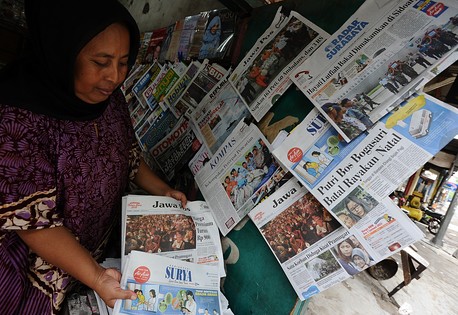
Haeril Halim
JAKARTA (The Jakarta Post/{Pacific Media Watch): The Home Ministry has confirmed that the government was preparing a new regulation obliging all foreign journalists to provide reports to regency, municipal and provincial authorities, as well as to the National Intelligence Agency (BIN), detailing their assignments in Indonesia.
The director-general of political and general administration at the Home Ministry, Soedarmo, said the new regulation was a follow-up policy drawn up after ministries and state institutions in charge of supervising foreigners in Indonesia, with the Foreign Ministry as the leading institution, agreed that it was important to monitor all activities of foreign journalists in Indonesia.
He said that as the new regulation required all foreign journalists to get permission from the local authority of wherever they wanted to carry out reporting assignments, the Home Ministry had issued circulars to all local governments across the archipelago to remind them to comply with the new regulation.
“The circulars were sent this month. The new regulation requires foreign journalists as well as foreign TV crews who want to report or to conduct research in Indonesia to get prior permission. Earlier, we did not have such a regulation so we didn’t know how to supervise their activities in Indonesia,” Soedarmo told The Jakarta Post on Wednesday.
“We’ll let them do whatever assignments they want in Indonesia, but they need to have permission first. In any country in the world there must be permission [for foreign journalists to compile reports],” he added.
Soedarmo said it was the Coordination Team of Foreigners Visitation taskforce at the Foreign Ministry that was responsible for implementing the new regulation. The team comprises officials from BIN, the National Police and other related institutions.
The regulation requires that all foreign journalists must report any activities they have planned to the unity, politics and public security (Kesbang) agencies at provincial, regency and municipal level before engaging in any journalistic activities in any region in Indonesia.
Finalising regulation
Foreign Ministry information and media director Sofia Sudharma said the ministry was still finalising the regulation. However, she said that after getting visas, foreign journalists were only required to get permission from the National Police’s intelligence and security division, instead of from BIN, before conducting assignments in Indonesia.
Sofia added that the regulation had yet to be finalised because the Foreign Ministry was currently working on synchronising the regulation with the recent presidential regulation issued by President Joko “Jokowi” Widodo on visa exemptions for 45 countries in various continents.
The visa exemptions are part of the first stage of the government’s economic structural reform package.
“We are still working on the adjustment. We will coordinate with related institutions during the adjustment period,” Sofia said, adding that the Foreign Ministry would also consult with the immigration office regarding the new regulation.
Jakarta Foreign Correspondents Club vice-president Sara Schonhardt declined to comment on the matter.
However, the Alliance of Independent Journalists (AJI) Indonesia condemned the new regulation, saying that the policy, if implemented, would close down access to information from Indonesia.
“The restriction is an over-reaction and impinges on the freedom of the press in Indonesia. The policy contradicts the pledge that President Jokowi made when he was in Papua that he would allow open access to foreign journalists,” AJI Indonesia chairman Sujarwono told the Post.
The new regulation, according to AJI Indonesia, showed that the government did not fully understand the principle of press freedom and freedom of expression in Indonesia, adding that the policy violated Article 28 of the Constitution on freedom of expression and Law No. 40/1999 on the press.
This work is licensed under a Creative Commons Attribution-NonCommercial 3.0 New Zealand Licence.




